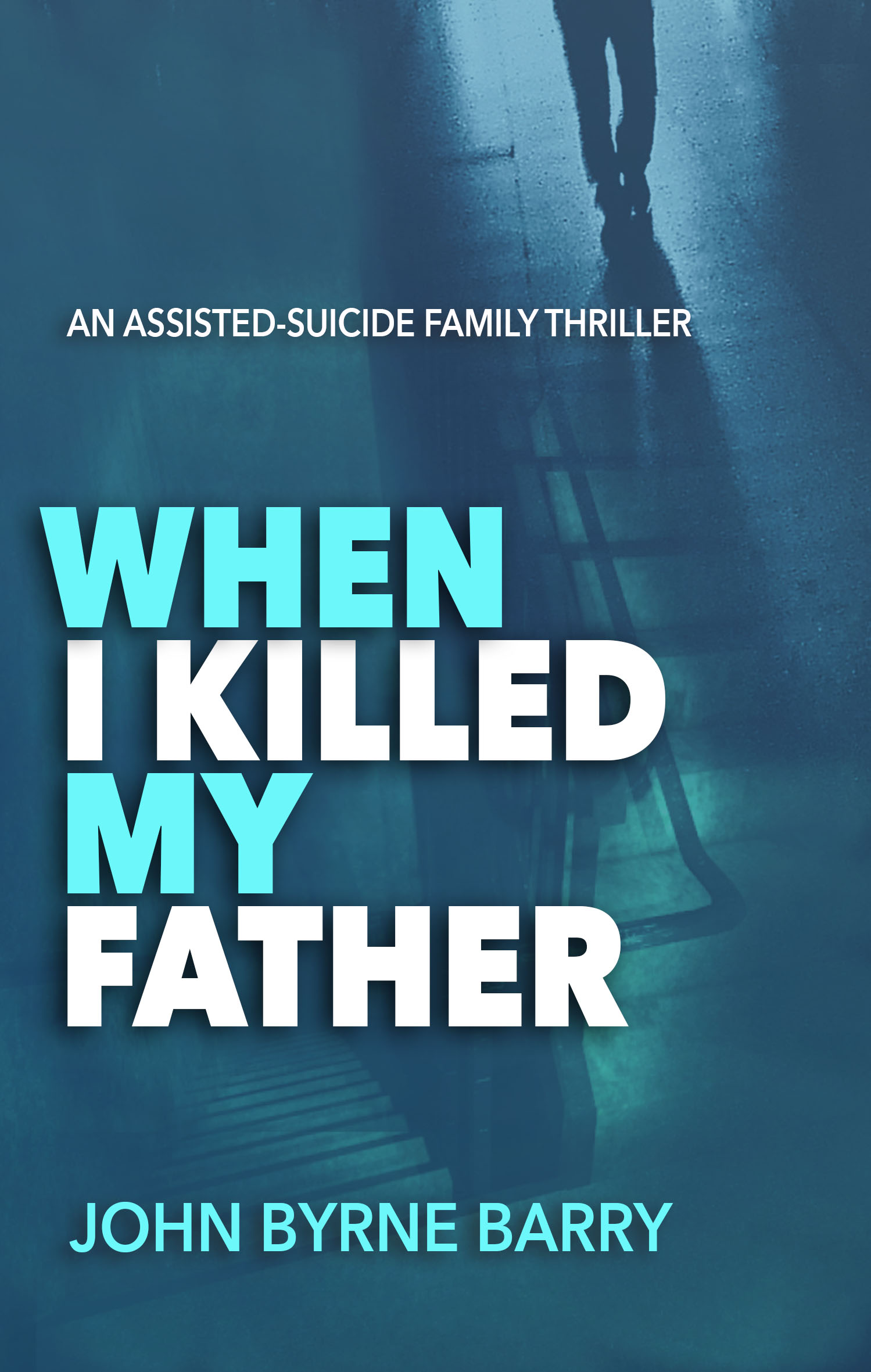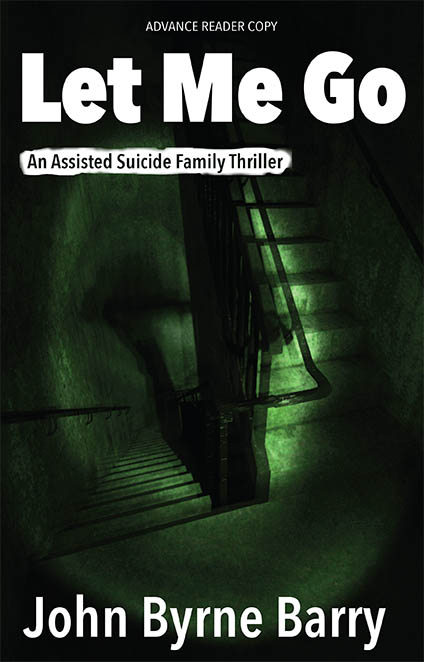Last fall, after a fellow author interviewed for a podcast, she said to me that she found it interesting that someone as articulate and accomplished as I was chose such a poor book title.
Ouch!
 She was referring to my most recent novel, which is titled, When I Killed My Father: An Assisted-Suicide Family Thriller. I thought that was a good title. I still do, but with less confidence than before.
She was referring to my most recent novel, which is titled, When I Killed My Father: An Assisted-Suicide Family Thriller. I thought that was a good title. I still do, but with less confidence than before.
It was just one person’s opinion, I told myself. Still, I had to wonder if a different title could make a difference in terms of visibility and sales.
Titles are hard. I wrote an 80,000 word novel, with 54 chapters and an epilogue, and I had to distill that into a few words.
The premise of my novel is simple enough – what if your ailing father asks you to kill him?
Here’s my elevator pitch: Psychologist Lamar Rose’s father is suffering from cancer and dementia, and wants his son to help him end his life. Lamar refuses, but his father keeps demanding, and he relents. Then, from the pulpit of the church at his father’s memorial, his sister accuses Lamar of murder.
I like to call When I Killed My Father a “page-turner with a conscience,” about a man caught between what is compassionate and what is legal.
Response from readers has been heartening, but I have not had as many readers as I’d hoped. Not everyone wants to read a book about death and dying and end-of-life decisions, of course, even though, as more than one reviewer noted, the novel is also fun and funny. My disappointing sales may have more to do with my subject matter than the title.
It is possible to republish with a new title, but I have 40 ratings/reviews on Amazon, with an average of 4.5 out of 5 stars, and 46 ratings/reviews on Goodreads, and I would hate to lose those reviews.
There are authors who have done republished with new titles, and managed to keep their reviews. But there’s no guarantee that her strategy will work for others.
The web is full of advice for writers, and no shortage of articles about how to promote yourself on social media, how to use the right keywords in your book description, how to find the right editor. But I have found hardly any useful advice on book titles, other than obvious things like, the title is uber important and you should devote your best energy to it.
The advice that is out there is more on how to avoid a bad title. As Tucker Max, co-founder of Scribe, says, “A good title won’t make your book do well, but a bad title will prevent it from doing well.”
Here are the attributes of a good book title, according to Max:
- Attention Grabbing
- Memorable
- Informative (Gives an Idea of What The Book is About)
- Easy To Say
- Not Embarrassing or Problematic For Someone To Say It
- The right length
Well, I think I’ve got three or four out of six. Here’s another guide to coming up with book titles.
When I was first writing When I Killed My Father, its working title was Edgewater, which was the name of the senior residence Lamar’s father lived in, on the lakefront on Chicago’s North Side.
There was a lot I liked about that title — the noirish sound of it most of all — but it’s such a common place name and it doesn’t signal the subject or genre of the book in any way.
I brainstormed many title ideas, such as:
- Cheeks as Smooth as Ice
- Die Now, Pay Later
- What I Did for My Dad
- My Father Begged Me
- What I Promised My Father
- At First I Said No
- The Measure of My Love
- I Can’t Stand to Live Like This
- Some Secrets Should Stay Secret
- The Duties of a Son
- Fulfilling My Father’s Wishes
And many more.
My brother Pat, who read an early draft, suggested Let Me Go, which I liked a lot, and that’s what I used when I published my advance reader copy.
 But one day, when I was sharing title ideas with fellow writers, one said Let Me Go was too subtle. I said, “Well, I don’t want to be too over the top and call it ‘Why I Killed My Father.'” She blurted out, “Oh, that’s so much better.”
But one day, when I was sharing title ideas with fellow writers, one said Let Me Go was too subtle. I said, “Well, I don’t want to be too over the top and call it ‘Why I Killed My Father.'” She blurted out, “Oh, that’s so much better.”
I took heed and that became my first choice, but because it sounded like a how-to book, not a novel, I changed the first word from “why” to “when.”
I’d love to hear what you think, whether you’ve read the book or not. (If you haven’t, you can read the first three chapters here.) Should I change the title? What title do you like best?
If you’ve published a book, do you have second thoughts about your title?
You can share your thoughts in the comments below or email me at [email protected].
(This post was originally published at johnbyrnebarry.com.)
I think it’s a good title. Certainly better than any of the others you listed. It’s a grabber.
Along with the title is the cover design. Your cover doesn’t do much for me; it adds no information to the title. I visualize an old man lying on his back on a gurney, perhaps dead, with his arm flopped over the edge, fingers spread.
I’m happy with my book titles, and with the cover designs. The titles relate to the stories, and the titles to Books 2 and 3 are also names of songs I wrote for the stories.
Thanks Mike, it would be easier to change the book cover design than the title, but I’m not convinced that a dead man on a gurney is going to make more potential readers choose to read it.
Gosh, this sounds tough. I remember when you were talking about titles for this book. I thought “Why I Killed My Father” was a fantastic title–I thought it was catchy like the one you chose, but that “why” there shows that there’s something about the reason to discover. By the time I found out you’d switched to “when,” the book was out, and there didn’t seem to be a reason to mention this–but I think of it every time I hear/see your title. I think the “why” version flows more smoothly too. I wonder why you went with “when” rather than “why.” I imagine there’ was a very good reason.
It seems to me, that a good thing about changing the title, would be that it would give you an opportunity for a whole other round of marketing and discussion of your book. Those Amazon and Goodreads reviews seem tough to lose, but could they be tied the new book as an edition?
Thank you for sharing with us about your process. I hope it helps you with your choice.
Karin, interesting take. I liked “Why” at first too, and even considered “How,” but thought “When” made it sound more like a story. Was not quite as much “on the nose.”
Interesting that you say that “why” adds some mystery.
I’m coming to realize though, that the problem is more likely that it is the subject that is the problem, not so much the title. One reader said that by writing an end-of-life story, I was limiting my audience. I knew that, I think, but I ignored it.
I even stopped writing it for almost a year, because of the heaviness of the subject, so it’s no wonder that some readers decide to pass. In the end, however, it was the story I wanted to write, and maybe I need to be satisfied with that.
I like “Duties of a Son”.
1) It does not give away the specifics that would put potential readers off from reading further.
2) It presents intrigue and raises the question, what sort of duties?
3) It gives enough of an indication that the book is going about family relations and the implied difficulties/conflicts in fulfilling duties.
4) It is short and easy to remember.